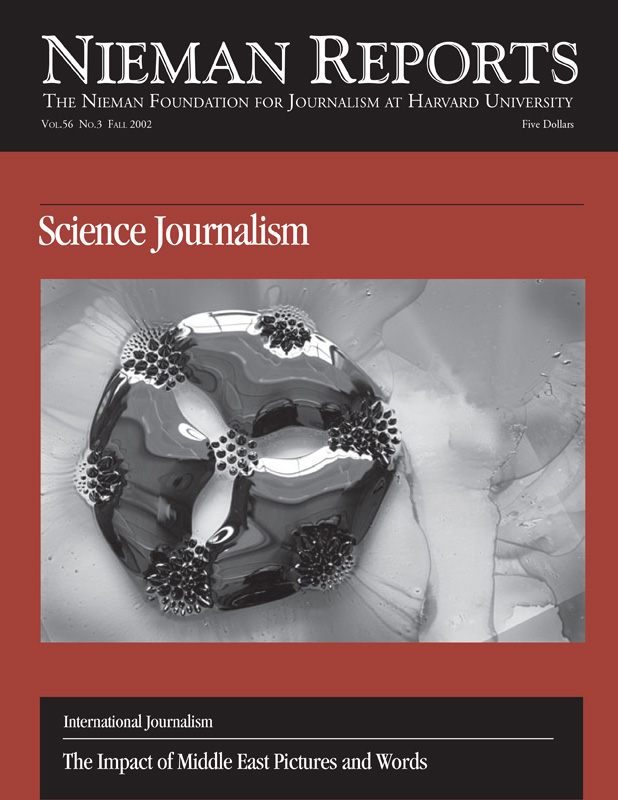In an April 2002 interview with Alicia Mundy in Editor & Publisher, Thomas L. Friedman, a columnist with The New York Times, described himself as “disoriented” and “speechless” in terms of how to write about the current situation in the Middle East. “Friedman agreed,” according to Mundy, “that the language and nomenclature right now is a minefield, just waiting for errant editors and deadline-deadened reporters.”
The emotional and potentially explosive nature of language, to use the minefield metaphor, is an ancient challenge for all writers, and the problems of choosing words carefully are certainly nothing new for journalists. But the language dilemma is perhaps exacerbated in the current coverage of the Middle East by the polarized intensity of emotion and the extended complexity of the situation. Added to these factors are the new dynamics of global media, in which journalists’ words are immediately juxtaposed with dramatic images and an array of “pundits” willing to offer instantaneous spins on events and their coverage.
In Middle East coverage, especially loaded words and problematic phrases are fairly easy to identify. But it can be extremely difficult to figure out how and when to use them or to avoid them. Are certain areas “occupied” or “in dispute?” Should specific actions be described as “acts of terrorism” or “acts of resistance?” What qualifies as a “protest” or “retaliation,” an “incursion” or “invasion?” What constitutes a “massacre?” Who should be labeled a “terrorist” and who a “freedom fighter?” Who are “gunmen,” and how are they similar to or different from terrorists or freedom fighters? Who are “separatists” or “rebels?” Are certain people best described as “suicide bombers” or “homicide bombers?”
Such word choices have been extensively debated in the media. Earlier this year, the public focused on the issue of how to refer to Palestinians who use their own bodies as weapons of murder. Should they be called “suicide bombers”—the description the media had used for years—or changed to “homicide bombers?” Fox News and the White House decided to switch to using “homicide bombers.” Fox executives reportedly believed that to use the word suicide “somehow glorifies the person committing the act.”
In a press briefing President Bush’s spokesman, Ari Fleisher, explained the White House shift to using “homicide bomber” this way: “The reason I started to use that term is because it’s a more accurate description. These are not suicide bombings. These are not people who just kill themselves. These are people who deliberately go to murder others, with no regard to the values of their own life. These are murderers. The President has said that in the Rose Garden, and I think that it’s just a more accurate description of what these people are doing. It’s not suicide; it’s murder.” Bush heightened this distinction when he said that the bombers were “not martyrs” but “murderers.”
There was not, however, a rush to conversion by other news organizations. At CNN, for example, spokeswoman Christa Robinson contended that the term “homicide bomber” indicates only that “you have killed other people—like putting a bomb in a trash can which kills people—but it doesn’t reflect that you also killed yourself. We feel that ‘suicide bomber’ is much more descriptive and accurate.” Supporters on each side of such word choices have emphasized that their concern is for accuracy and clear description. But media critics and talk-show pundits have been quick to charge bias either way: The use of “suicide bomber” is said to indicate a pro-Palestinian sympathy; “homicide bomber” is said to show a slant towards Israel.
While an individual speaker or writer might not be consciously or deliberately intending to use slanted language, the “accuracy” of such phrases is embedded in their rhetorical context. In their role as interpreters, listeners and readers instinctively ask the classic questions of rhetoric: Who is saying what to whom? On what occasion? In what manner? For what purpose? And with what attitude?
As constructs of the English language, “suicide bomber” and “homicide bomber” are awkward since they each involve Latin-derived nouns used as adjectives and an ambiguous shorthand that captures only part of a complex reality. If we put the two terms together, and give extended attention to the details of specific cases, then we might at least approach some sense of a full and fair treatment of the story. For example, a reporter might begin by referring simply to “bombers” and clarify in the details that they took their own lives in the process of killing others. The shorthand is lost, but something of greater value might be gained.
Because journalists seldom have enough time or space for this kind of treatment, this vision sadly remains only an ideal. It should serve, however, as a constant reminder of how journalists must strive harder to navigate the minefield of language.
Beverly Wall is an associate professor and director of the Allan K. Smith Center for Writing and Rhetoric at Trinity College in Hartford, Connecticut. She is founder of the Intercollegiate E-Democracy Project and has been a commentator on political rhetoric and the media for C-SPAN’s “Washington Journal,” Reuters, BBC Radio London, and National Public Radio’s “The Connection.”


